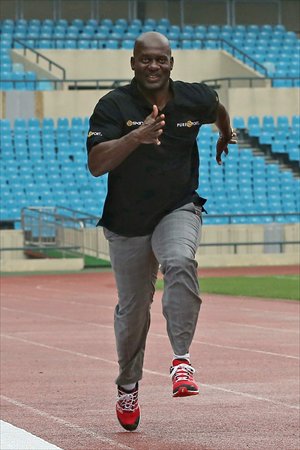HOME >> SPORTS
I was 'nailed on a cross' for 25 years: Johnson
Source:AFP-Global Times Published: 2013-9-25 0:18:02

Former Canadian sprinter Ben Johnson runs on a track of the Olympic Stadium in Seoul, 25 years after he took the men's 100 meters title with what would have been the world record of 9.79 seconds at the 1988 Seoul Olympic Games. Photo: CFP
Canadian sprinter Ben Johnson returned Tuesday to Seoul's Olympic Stadium - 25 years to the day after the steroid-assisted 100 meters final victory that destroyed his career and reputation.
The runner revisited the site of his stunning triumph and downfall to bring an anti-doping message for a sport still struggling to rid itself of banned substance use.
"It feels good to be back," Johnson told AFP as he stepped out onto the track where, at 1:30 pm on September 24, 1988, he lined up for a 100 meters final that would become known as the "dirtiest race in history."
"This is where history was made," Johnson said. "Some might call it bad history, but I don't see it that way."
First out of the blocks in the final, Johnson destroyed a field that included his hated rival Carl Lewis and stormed to victory in a world record time of 9.79 seconds.
Three days later he was stripped of his medal, his time and ultimately his career after it was announced that he had tested positive for stanozolol, a banned anabolic steroid.
Six of the eight finalists would eventually be implicated in doping scandals, including Lewis, who it was later revealed had tested positive for stimulants at the US Olympic trials.
Johnson, 51, has admitted to years of steroid use, but still feels he was unfairly picked out for vilification at a time of widespread drug use in athletics.
"I was nailed on a cross, and 25 years later I'm still being punished," he said.
"Rapists and murderers get sent to prison, but even they get out eventually.
"I know what I did was wrong. Rules are rules. But the rules should be the same for all. But politics always plays in sports."
Johnson's return to Seoul was the final leg of a global tour as standard bearer of the ChooseTheRightTrack campaign, which calls for new strategies to combat continued drug use in athletics.
On Tuesday, at precisely 1:30 pm, Johnson stood at the starting point on Lane 6 - his lane in the final - and strolled down the track he burned up in 1988.
As he walked, two volunteers unrolled in his path a 100-meter long petition with 3,700 signatures the campaign has collected over the past month.
At the finish line, he recreated the famous finger-raised pose he struck at the moment of victory 25 years ago.
"Of course I feel remorse, regret, but it's not the biggest issue in my life anymore. I've accepted it and I've moved forward," he said.
The sport has recently been rocked by a string of doping cases, including high-profile athletes such as Tyson Gay, Asafa Powell and Veronica Campbell-Brown.
The sport's world governing body, the IAAF, announced last month that it would impose four-year bans for drug offenders from 2015.
Seven athletes, including one finalist, tested positive for doping at August's World Athletics Championships in Moscow.
"The testing procedures may have got better and more accurate, but the drugs are advancing as well," Johnson said.
The campaign is not limited to raising awareness of doping in athletics, but across the sporting spectrum.
Johnson voiced some sympathy for Lance Armstrong, saying the disgraced American cyclist was being singled out, much as he was, in a sport where doping is prevalent.
Asked what he would change if he could go back 25 years, Johnson said there was no point trying to live in the past.
"But I still believe I could have won the Olympic Games without any drugs back then," he said.
AFP - Global Times
Posted in: Miscellany